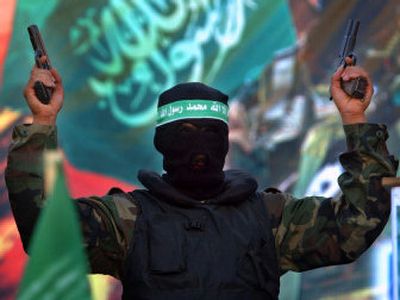Israel launches strikes on Gaza; fighting threatens peace plan

JERUSALEM – Israel launched a series of airstrikes on the Gaza Strip on Saturday in response to renewed rocket attacks by Palestinian militants on nearby Israeli communities.
The moves by both sides cast doubt on attempts to get the Middle East road map for peace back on track. Israel’s defense minister vowed to deliver a “crushing” blow to militants.
At least two Palestinians were killed in the attacks, the first that Israel has staged since officially ending its 38-year military rule of the Gaza Strip earlier this month, when it pulled its settlers and soldiers out of the densely populated coastal region.
Palestinian leaders condemned the airstrikes as a blow to peace efforts, while the Israeli government blamed Palestinian officials for not doing enough to prevent militants from launching rockets.
The escalation of violence came a week ahead of a planned summit between Israeli Prime Minister Ariel Sharon and Palestinian leader Mahmoud Abbas. The summit is meant to renew momentum for the stalled U.S.-backed road map.
Saturday’s attacks also could threaten Sharon’s efforts to fend off a political revolt from members of his own Likud Party who opposed Israel’s pullout from the Gaza Strip.
Sharon is trying to persuade Likud Party members to reject a request from rival Benjamin Netanyahu to quickly hold internal elections and elevate the former prime minister as the new party leader. A vote Monday on whether to hold the leadership election amounts to a de facto Likud referendum on the prime minister.
Netanyahu will most likely use the Gaza attacks as evidence that Sharon’s Gaza Strip gambit has failed to restrain Palestinian militants or make Israelis safer.
The latest cycle of violence began Friday when Israeli forces killed three Islamic jihad militants during a raid in the West Bank.
Hospital officials said at least 10 Palestinians were killed and 80 wounded Friday afternoon when a large explosion rocked a Hamas rally in a refugee camp near Gaza City. Hamas initially blamed the explosion on an Israeli airstrike, but the Israeli military categorically denied playing any role in the incident. Palestinian Authority officials said the blast was probably caused by explosives carried by militants at the rally.
Whatever the cause, Islamic militants responded to the West Bank killings and Friday’s explosion by firing more than 40 homemade rockets into neighboring Israeli communities, slightly wounding six people in the nearby town of Sderot, including one who lost part of his leg.
Before Israel pulled out of the Gaza Strip, such attacks were routine and Israel would normally respond only if the rockets proved fatal.
At the time of Israel’s pullout from Gaza, Defense Minister Shaul Mofaz warned Palestinians that he would have “zero tolerance” for future rocket attacks once Israelis were gone.
True to his word, Mofaz sealed off the Gaza Strip, rushed troops to the border and ordered a series of airstrikes Saturday. Planes zipped over the area throughout the day, jarring residents with sonic booms and firing missiles at selected targets.
The most deadly attack came in the afternoon when a missile hit a car in Gaza City, killing two members of Hamas’ military wing, including a 17-year-old boy.
Israeli forces also dropped hundreds of anti-Hamas leaflets across the Gaza Strip that called on the Palestinian Authority to combat terrorism and vowed to “strongly respond against any of those who threaten the security of the citizens of the State of Israel.”
Hamas issued a statement vowing to retaliate for the Israeli attacks “everywhere.”
Sharon met with his Security Cabinet Saturday night to weigh further action. While an immediate invasion appeared unlikely, much depends on whether leaders on both sides are able to contain the violence in the coming days.